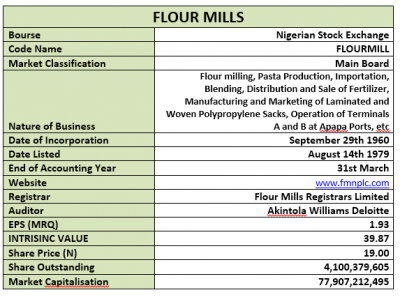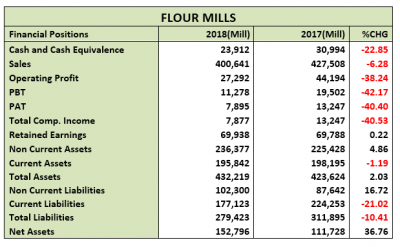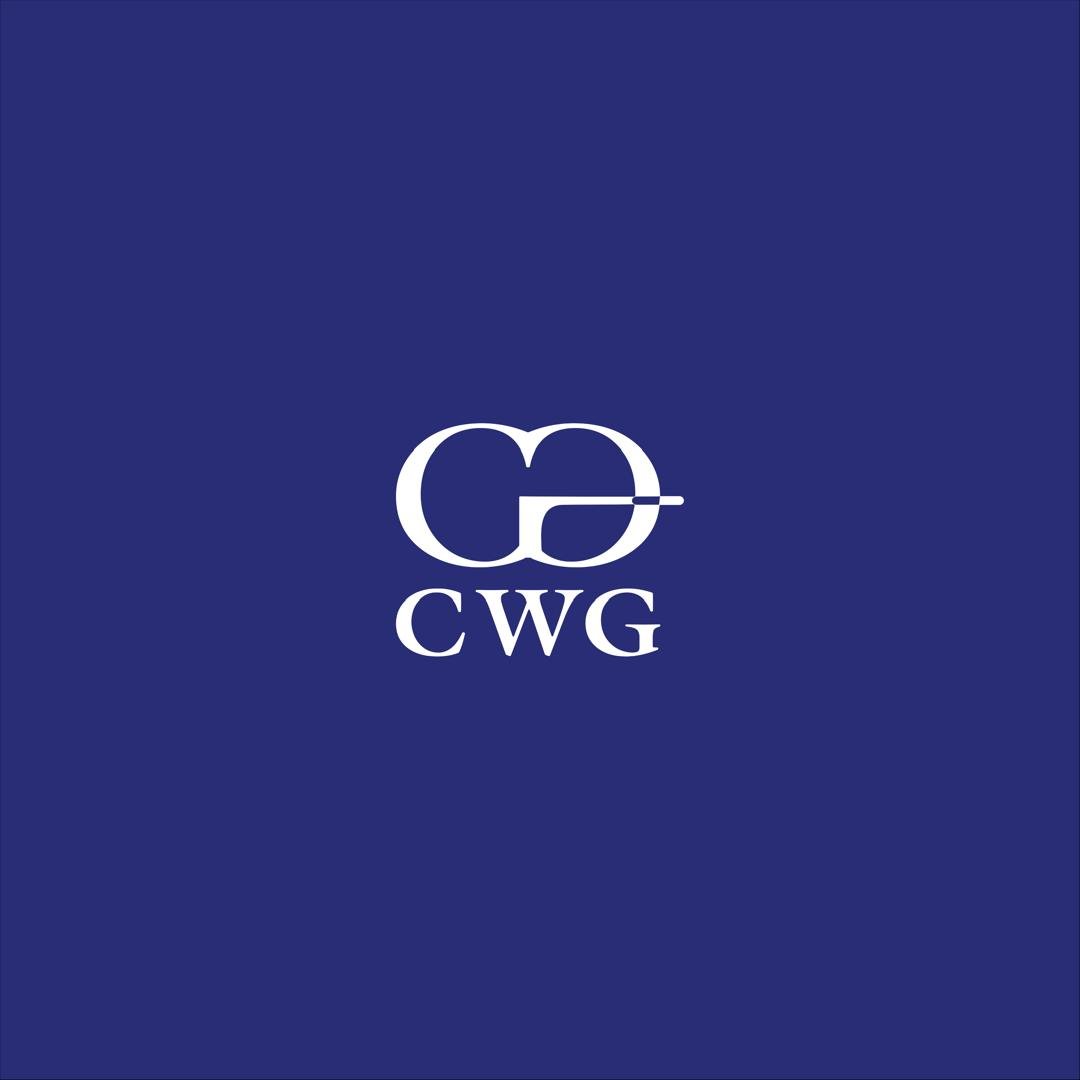
Company: Flour Mills Nigeria Plc (FLOURMILL)
Rating: Buy (Long Term)
Current Market Price at Earnings Release: N19.00
Intrinsic Value: N39.87
Latest Cash Div: N1.00
By: Jeariogbe Tunde Segun (Equity Analyst)
Key Financial Tickers
• This report observed the nine months financial performance of Four Mills Nigeria Plc, for the period ended 31st December, 2018. Meanwhile, full year indices were utilized in arriving at the intrinsic value for each unit of its shares.
• Please note the change in the shares outstanding used in calculating ratios in the current result (4,100,379,605 units) as against those of the corresponding period of 2017 (2,624,237,187 shares).
• The difference followed the listing of its most recent rights issue of 1,476,142,418 ordinary shares of 50 Kobo each at N27.00 per share on the basis of 9 new ordinary shares for every 16.
• As a result of the said increase in share outstanding, there are wide differences observed in the estimated ratios.
• In summary, this implies that management has not seriously improved performance so as to accommodate the increase.
The Company’s Product/Strength
• The major revenue drivers for Flour Mills are its investments to improve capacity in the different operating business segments, the most significant of which was the commissioning of a 750,000MT sugar refinery in Lagos to increase operating capacity from 24% at the end of FY’14. The plant is currently operating at about 50% capacity, producing 375,000MT.
• We expect revenue from the sugar refinery to grow at a much lower compound rate of 2.6% annually till 2019.
• Also, the increase in its flour milling capacity will contribute significantly to revenue growth in the ‘other foods’ segment (food businesses apart from Golden Sugar) over the next few years from when the company launched its products in the snacks, powdered drinks and breakfast cereals segments of the market.
• We estimate that the ‘other food’ segments will grow up to 3.5% YoY till 2019, especially given ongoing discussions and developments around a new minimum wage in the country that would increase purchasing power.

Corporate Figures
• Turnover for the nine-month of 2018 is 6.28% below the corresponding quarter in 2017, given that N400.64 billion was posted as against the N427.50 billion reported in Q3-2017
• Despite the reduced TO, Selling and Distribution Expenses was high at N5.932 billion compared to N4.037 billion in similar period of 2017, reflecting in our opinion, the high cost of doing business in the country. This is also especially true of companies with imported inputs/raw materials.
• Similarly, Administrative Expensive stood at N14.937 billion, higher than the N13.311 billion posted in Q3-2017, which will undoubtedly increase in this financial year, when the new minimum wage regime is activated by the company.
• Thus, Operating Profit stemmed below the 2017 figure at a total of N27.292 billion, compared to the N44.194 billion of the comparable quarter.
• Profit before Tax was estimated at N11.278 billion compared to the N19.502 billion reported for same period in 2017.
• Having considered Tax Expenses for the period, N7.895 was reported as Profit, which is 40.40% below corresponding quarter’s profit of N13.247 billion.
• Due to the estimated reduction on available-for-sale investment, Total Comprehensive income for the period was estimated at N7.877 billion as against N13.247 billion in Q3-2017.
• Retained earnings improved mildly over the period to N69.938 billion as against N69.788 billion reported in the corresponding period.
• Non Current Assets increased marginally, by 4.86% from N225.428 billion to N236.377 billion, confirming marginal capital investment within the observed periods.
• Meanwhile, Current Assets dipped by 1.19%, having moved to N195.842 billion from N198.195 billion reported in the previous third quarter financial.
• Non Current Liabilities increased within the period to N102.300 billion, compared to the N87.642 billion in 2017 third quarter.
• Enhanced by reduction in Bank Overdraft and Borrowings in the current third-quarter financial compared that of 2017, the Current Liabilities stood at 21.02% below that of the previous quarter. See below table for details

Liquidity/Risk Ratios
• Although the management of Flour Mills confirmed that it had exited high interest rate liabilities, the Debt to Equity Ratio jumped to 45.24% from the 17.72% estimated in the corresponding quarter of 2017.
• Current Ratio stood slightly above unity, implying its fitness to settle current liabilities as at when due.
• Fairly above others in the industry, Beta value of 0.99 as against 0.97 industry average indicates lower volatility, when compared to that of the Nigerian Stock Exchange (NSE).
• Although far below the industry average of 11.11x, Flour Mills still has enough capacity to service its interest yielding liabilities whenever they fall due. Please note, it is strictly advised that unless the company improves its financial performance indices, assessing interest yielding liabilities should be avoided.

Profitability Ratios
• Cost of Sales margin is currently estimated at 88.37%, slightly above the 86.89% estimated from the comparable quarter statistics.
• Profit before Tax margin is 2.82% and lower than the 4.56% margin estimated from the corresponding quarter figures.
• Similarly, Profit after Tax margin stood below that of Q3-2017. We have estimated 1.97% as against the previous 3.10%
• Return on Average Equity is currently estimated at 5.17%, which is far below the 11.86% achieved in similar period of 2017.
• Return achieved on Average Assets is now 1.83%, as against 3.13%.
• This confirmed a lower profitability rating by the management of Flour Mills Plc. We believe that this shows the true economic state of higher running expenses and tight business terrain in the country. Further impacting the unfavorable business environment is the increased rate of insurgency and other related killings in various part of the country, especially in northern Nigeria, in addition to the constant unease in the country’s oil rich Niger Delta region.

Efficiency Ratios
• Testing the management’s efficiency using the Asset Turnover, the Ratio declined by a marginal 8.15% from 100.92% to 92.69%.
• Also tested was the Equity Turnover, currently at 262.21% as against the 382.63% estimated in 2017. Please note that the newly raised capital through Rights Issue further impacted the drop.
• In other words, the equity was multiplied 2.83 times through the nine months of 2018 financial activities, far below the 3.79 times in Q3-2017.
• It was also estimated that Fixed Assets turnover is same as 92.69%, slightly below the 100.92% estimated in Q3-2017.

Investment Ratios
• Following same trend as the earnings, earning per share (EPS) of Flour Mills Plc in its Q3- financial performance dropped by 65.32% against the comparable period of 2017. The current EPS estimate is N1.93 each.
• The said EPS is a yield of 10.13% of the price of Flour Mills on the NSE as at the date the result was made available to the investing public, representing 43.69% below the 18.00% yield achieved in the similar period of 2017.
• Price Earnings Ratio (PE/Ratio) is currently estimated at 3.29x as against the previous 1.85x. Although this is mainly used in confirming investment recouping time, it is also indicates investor sentiments on the price of Flour Mills. Consequently, the reduction observed implies negative sentiments.
• Two ratios confirming an underpriced position of each share of Flour Millsshare price on the floor of the Exchange are the Price to Book Value (P/BV) and the Book Value (BV). Since P/BV stood below one (1), it implies that the shares are theoretically underpriced. Confirming this further is the estimated BV of N37.62 as against the market price of N19.00 (as at the released of the current full year result) and the current market price of N20.00 on February 8, 2019.

Valuation
• On the strength of the increased share outstanding and glaring unfavorable business environment within which the company running its business, we have downgraded our growth expectations along future value generation by the milling firm. In other words, our fair value was adjusted down to N39.87.












